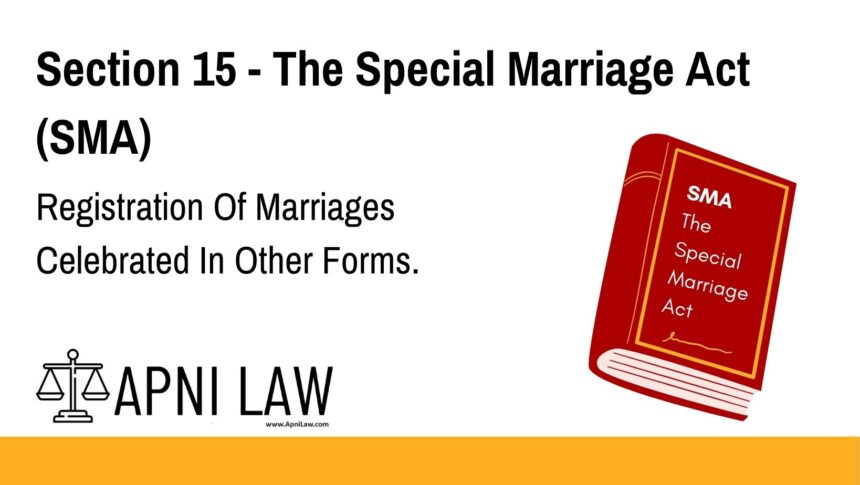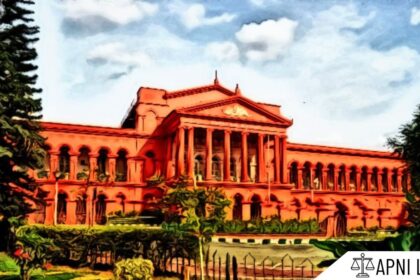Code: Section 15
Any marriage celebrated, whether before or after the commencement of this Act, other than a marriage solemnized under the Special Marriage Act, 1872 (3 of 1872), or under this Act, may be registered under this Chapter by a Marriage Officer in the territories to which this Act extends if the following conditions are fulfilled, namely:
(a) a ceremony of marriage has been performed between the parties and they have been living together as husband and wife ever since;
(b) neither party has at the time of registration more than one spouse living;
(c) neither party is an idiot or a lunatic at the time of registration;
(d) the parties have completed the age of twenty-one years at the time of registration;
(e) the parties are not within the degrees of prohibited relationship:
Provided that in the case of a marriage celebrated before the commencement of this Act, this condition shall be subject to any law, custom or usage having the force of law governing each of them which permits a marriage between the two; and
(f) the parties have been residing within the district of the Marriage Officer for a period of not less than thirty days immediately preceding the date on which the application is made to him for registration of the marriage.
Explanation of Section 15 of the Special Marriage Act
Section 15 allows couples who married through other customs or religious ceremonies to register their marriage under the Special Marriage Act. This provision helps couples get legal recognition of their union—even if it wasn’t originally performed under the SMA or the earlier Special Marriage Act, 1872.
However, the law sets specific conditions that must be met to register such marriages. These include:
- A marriage ceremony must have taken place, and the couple must be living together as husband and wife.
- Neither person can have another spouse living at the time of registration.
- Both individuals must be of sound mind (i.e., not suffering from mental incapacity).
- Each party must be at least 21 years old.
- The couple must not be related to each other within the prohibited degrees of relationship—unless their custom or personal law allows such marriage (in case it occurred before this Act began).
- Finally, both individuals must have lived in the district of the concerned Marriage Officer for at least 30 days before applying.
This section ensures that previously celebrated marriages, especially those performed under personal laws or customs, can be registered and recognized by the state.
Illustration
Example 1: Religious Marriage Registered Under SMA
Arjun and Fatima were married in a traditional ceremony five years ago. Now, they want their marriage to be officially recognized under civil law. Since they meet all conditions—including having lived in the same district for more than 30 days—they apply under Section 15 and successfully register their marriage.
Example 2: Ineligible Due to Existing Marriage
Rahul tries to register his second marriage under this section, while his first wife is still legally alive and married to him. His application is rejected because Section 15 requires that neither party have another living spouse at the time of registration.
Common Questions and Answers on Section 15 SMA
1. Can a traditional or religious marriage be registered under this section?
Yes. As long as the couple meets all the listed conditions, including proof of an actual ceremony and cohabitation, they can register their marriage under Section 15.
2. Is there a time limit for registering such marriages?
No. Marriages celebrated before or after the commencement of the Act can be registered, provided all conditions are satisfied.
3. What if the couple belongs to different religions?
That does not matter under this section. As long as they meet the criteria, they can register their marriage regardless of religion or caste.
4. Is proof of cohabitation required?
Yes. The couple must have been living together as husband and wife since their marriage ceremony. Evidence of this may be requested during the registration process.
5. Can a second marriage be registered under this section?
No. Section 15 allows registration only if neither person has a living spouse at the time of applying.
Conclusion
Section 15 of the Special Marriage Act serves a vital purpose—it allows couples who married outside the Act to gain legal recognition of their relationship. This registration can simplify legal procedures, assist with property claims, and establish official marital status. The conditions outlined ensure the process is fair, consistent, and respectful of both legal and cultural boundaries.
To learn more about marriage laws and rights, visit ApniLaw for detailed guides and legal resources.








